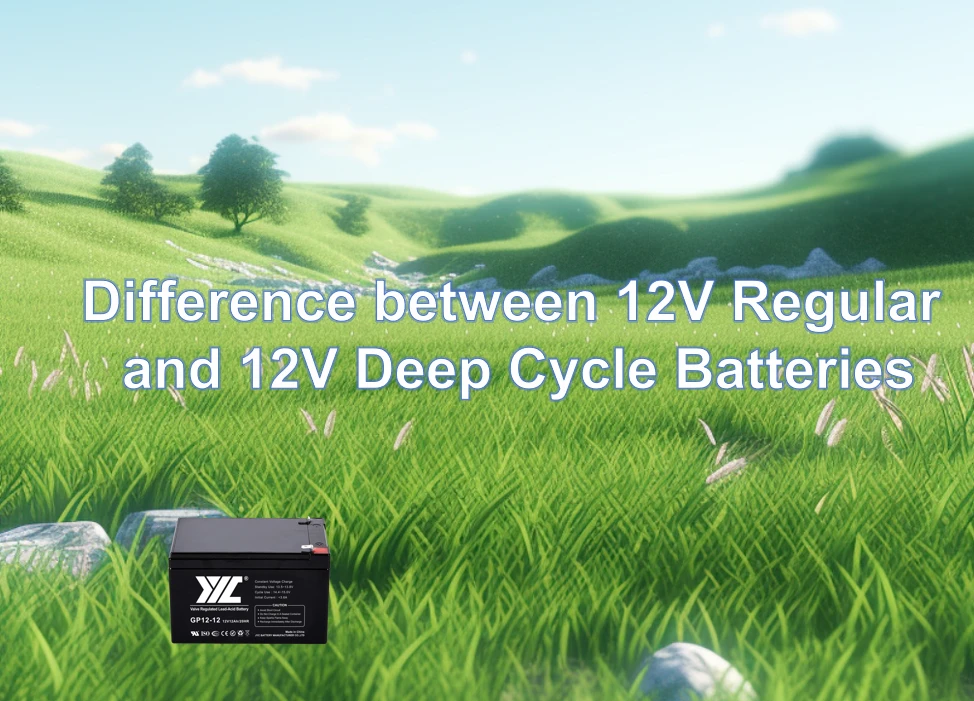
Introduction
When shopping for batteries, it can be challenging to determine whether you need a regular 12V battery or a deep cycle 12V battery. They are used in different circumstances, and distinguishing between them will be essential in many applications. This article will discuss the differences between the two and what they are used for their characteristics, advantages, and applications.
12V Batteries: More than Just for Automobiles
Before we delve into the differences, it’s essential to recognize that 12V batteries have a broader range of applications than solely powering vehicles. Automobile batteries are indeed 12V, just like solar cells or uninterruptible power supply (UPS) batteries also fall under this voltage category. Understanding these differences can help you choose the right battery for your specific needs.
12V Regular Batteries
12V regular batteries, often referred to as starting batteries, are mainly meant to provide brief increased bursts of current able to start a motor. They take a swipe and have thin plates. Their discharges are shallow with a low depth of discharge that is not supposed to be discharged more than 50% before recharge.
Characteristics of 12V Regular Batteries
These types of batteries consist of the following characteristics:
Voltage Output and Capacity: 12V regular batteries undergo an output voltage of 12V. However, their records have relatively fewer capabilities measured by ampere-hours (Ah), meaning they release large amounts of current within the shortest time possible.
Suitable Applications: 12V regular batteries are ideal for high-power applications in short durations. They do not cope well with long discharges and recharge cycles, though. Applications include powering smaller appliances like fans, radios, and lanterns, as well as starting motor vehicles, lawnmowers, and other small engines.
12V Deep Cycle Batteries
On the other hand, 12V deep cycle batteries are a type of battery that is designed to allow for being deeply discharged and recharged again and again without any damage. They find applications in use cases where power applications run over extended periods, such as RVs, boats, solar power systems, and off-grid living. These kinds of 12V deep-cycle batteries are made to supply sustained power over an extensive period.
Characteristics of 12V Deep Cycle Batteries
Some unique characteristics they have included:
High capacity: The high capacity, which is stored within 12V deep cycle batteries, enables them to be able to deliver power to devices for considerable amounts of time.
Deep discharge capability: 12V deep cycle batteries can easily be discharged to a depth above 80% without any kind of damage caused to the battery.
Long cycle life: 12V deep cycle batteries are designed for hundreds if not thousands of charges as well as discharge cycles. Thus, this is good enough for applications that require the high-use frequency of the applied battery.
Ideal Applications: Deep cycle batteries are usually chosen for applications that need low but continuous power discharge, such as running appliances within an RV or keeping solar energy systems working.
Here is a table summarizing the key differences between 12V regular and 12V deep cycle batteries:
| Characteristic | 12V Regular Battery | 12V Deep Cycle Battery |
| Lead plates | Thinner | Thicker |
| Reserve capacity | Lower | Higher |
| Cycle life | Shorter | Longer |
| Depth of discharge | Less | More |
| Applications | Starting cars, running small appliances | Powering RVs, boats, and solar systems |
Importance of Understanding the Differences
Understanding the differences between 12V deep cycle and 12V regular batteries goes a long way in determining how your battery will perform as well as how long it will last in your specific application.
For example, an automobile application’s deep cycle 12V battery will not have the reserve capacity. It will thus not last as long as it could in a boat or marine application because it also does not tolerate deep discharges. Similarly, using a 12V deep cycle battery in a boat will potentially reduce the cranking ability to where the battery would be useless and unable to start the motor.
Choosing the right battery for your intended purpose allows you both superior performance and greater longevity, saving you both time and money.
The Bottom Line
Ultimately, the difference between 12V regular and 12V deep cycle batteries lies in their design and intended applications. Regular batteries are simply designed to supply high currents for short pulses or surges, which makes them suitable for vehicle start-ups, unlike deep cycle batteries, which have a steady current design meant to power appliances in vehicles like recreational vehicles or even systems for harnessing renewable energy sources.
JYC Battery manufactures 12V deep cycle batteries and 12V regular batteries. Our batteries are made with high-quality materials and construction and offer excellent performance and reliability. We offer a wide range of 12V regular and deep cycle batteries to choose from, so you can find the perfect battery for your needs. If you are unsure which type of battery is right for you, don’t hesitate to get in touch with JYC Battery for assistance.



